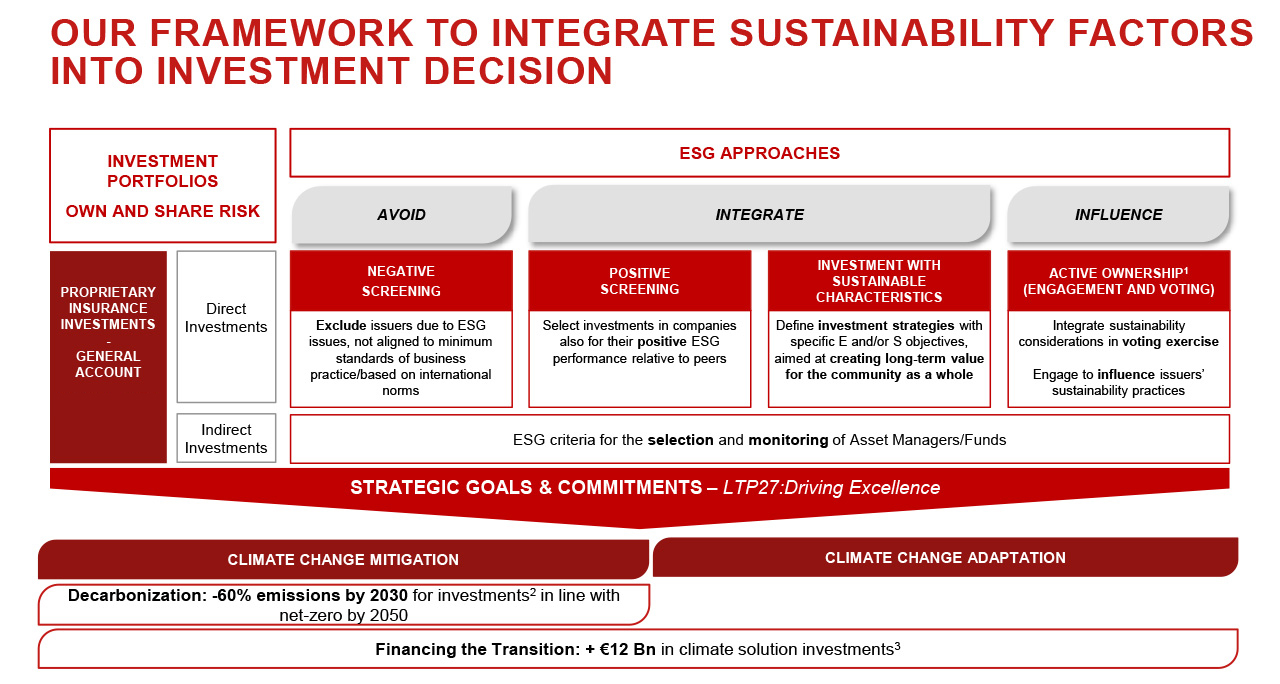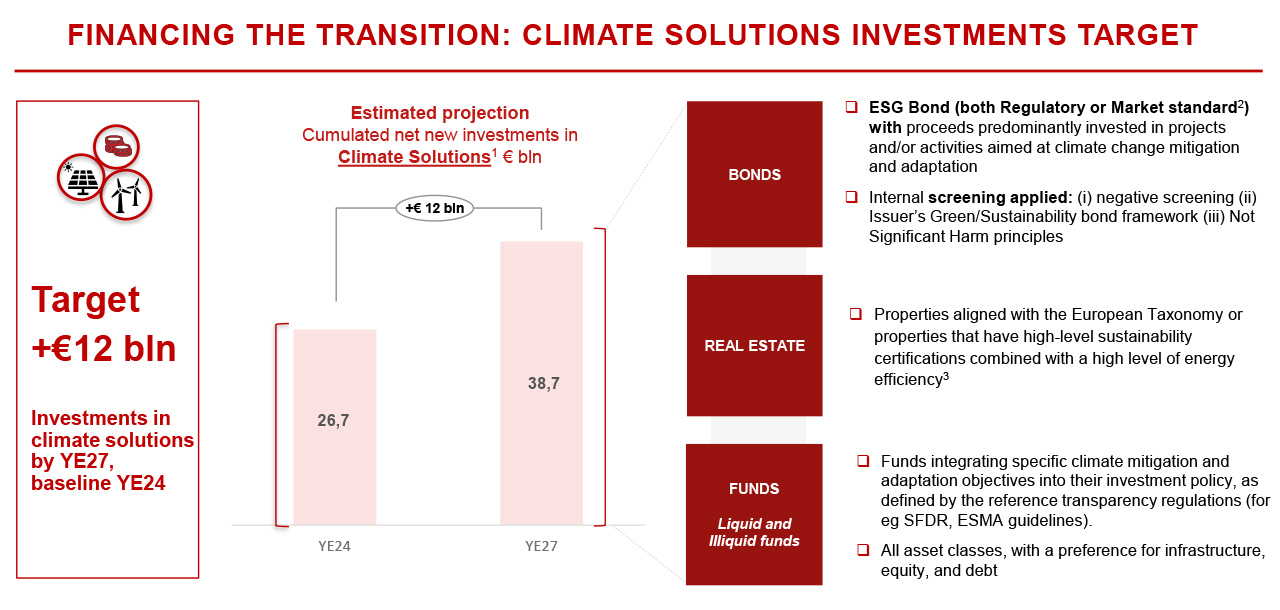Sustainable investments framework
The inclusion of sustainability within the investment process is a key instrument to allow an insurance group to create long-term sustainable value for its stakeholders. As an institutional investor Generali plays a fundamental role in contributing to achieve sustainable development goals while avoiding financing economic activities that have a negative impact on the environment and society.
In this context, the integration of sustainability factors in the investment process has a dual role: on the one hand, it allows to positively contribute to the development of a more sustainable economy, with a positive impact on the environment and society; on the other, it allows a better management of sustainability risk to which its investments are exposed.
The Group defined a framework for the integration of environmental, social and good governance factors in insurance proprietary investments.

1 Group Active Ownership 2024 Report;
2 Target for investments includes listed equity, corporate bonds, and real estate within the general account portfolio and it is defined as year-end 2029 vs. 2019. For listed equity and corporate bonds, the reduction is measured by carbon intensity weighted on € million invested, for real estate by carbon intensity per square meter. Subject to market environment and constraints;
3 Target covers a broad range of asset classes, both direct investments and funds, and includes bonds, corporate, government infrastructure debt-equity, and real estate. Subject to market environment and constraints. It is measured as 2025-2027 cumulated net new investments.
Negative screening
The negative screening approach aims at excluding from the Group’s investable universe those issuers, sectors or activities with poor ESG practices or not aligned with the Group climate strategy that could potentially impact on their long-term financial performance and/or expose the Group to higher sustainability and reputational risks.
The methodology adopted by the Group is based on three typologies of negative screening:
- Screening at activity level: the screening aims at excluding companies involved in economic activities with a negative impact for the environment and society and, indirectly, also a financial risk:
- companies operating in the unconventional weapons sector1;
- companies operating in / project dedicated to the thermal coal sector;
- companies operating in / project dedicated to the unconventional oil and gas sector.
- conventional oil & gas companies presenting transition plans (strategy, targets, and decarbonisation plans) that are not adequate.
- Screening of controversies: the screening aims at excluding those issuers (both corporate and sovereign) involved in severe controversies linked, among the others:
- for the corporate issuers, to violations of the UN Global Compact and of the OECD Guidelines for Multinational Enterprises;
- for the sovereign issuers, the assessment considers several elements. First of all restrictions apply to country involved in severe violations related to human rights, financing terrorism and money laundering as well as tax evasion. On top of the described elements, the assessment of the country relies on a ESG controversy score calculated internally according to an internal model.
- ESG Laggard: This screening aims at excluding from the investable universe those corporate and sovereign issuers which, based on the result of an ESG analysis have been identified as having a particularly low ESG profile (ESG Laggards) compared to the sector to which they belong (corporate) or to the global universe of the asset class (sovereign).
According to their level of involvement and responsibilities in the abovementioned controversies, and based on an internal assessment, the companies are either engaged or Restricted. In the last case, specific actions are taken, including a ban on new investments in the company, the divestment of any equity exposure and the run-off of fixed income exposure.
1 For what concerns cluster bombs and antipersonnel landmines, the exclusion criteria are compliant with the requirements of the Italian law n. 220 of the 9th of December 2021.
Positive screening
The positive screening is an additional approach to negative screening and provides a further mean of influencing investment choices also on the basis of ESG factors.
The approach aims at considering the ESG performance of issuers during the investment selection with the goal of identifying and overweighting in the portfolio those companies that are better placed to seize the opportunities of a growing ESG market while mitigating sustainability risk. This approach allows to integrate elements that may not be considered in the traditional financial analysis.
The Group's insurance companies that use this screening invest in issuers or projects selected also for their positive ESG performance compared to their peers (sector, geographical area, etc.) with a best-in-class, best-in-universe and/or best-effort approach deriving from the ESG analysis.
Investment with sustainable characteristics
The Group promotes, for the various asset classes, specific investment strategies aimed at supporting economic activities with sustainability characteristics capable of creating long-term value not only for investors but also for society as a whole.

1 Defined as investment in economic activities that contribute to decarbonisation and climate resilience, selected based on criteria consistent with existing taxonomies and market reference frameworks
2 For eg bond compliant with European Green Bond standard or Bond compliant with ICMA principles
3 High-level certifications include: BREEAM Very Good or higher; LEED Gold or higher; and equivalent levels of local certifications (HQE, DNGB). High energy efficiency is defined as equal to or better than C or the top 30% in the reference market.
Support to climate transition
In line with the commitment to support the climate transition, the Group has set a target for investments in so-called climate solutions, i.e., investments that contribute to decarbonisation and climate resilience, selected based on criteria consistent with existing taxonomies and market reference frameworks.
The achievement of the target, subject to market conditions and constraints, will be supported by various types of investments:
- corporate and government green and sustainable bonds where, based on the issuance prospectus, the proceeds are predominantly invested in projects and/or activities aimed at climate change mitigation and adaptation4;
- real estate investments: properties that contribute to the achievement of the target are aligned with the European Taxonomy or properties that have high-level sustainability certifications combined with a high level of energy efficiency5
- funds: the funds are characterized by integrating specific climate mitigation and adaptation objectives into their investment policy, as defined by the reference transparency regulations (SFDR, ESMA guidelines, and similar). All asset classes may be subject to investment in this category, with a preference for infrastructure, equity, and debt classes.
These investments will also be pre-screened through the Group's negative screening criteria to verify their overall sustainability profile.
This objective represents an evolution of the target achieved at the end of 2024 through new green and sustainable investments, with a specific focus on climate change goals and extending the scope to a wide range of investments.
Other investments with social characteristics:
Fenice 190
Fenice 190 is a € 3.6 billion investment plan to support the recovery of the European economies impacted by Covid-19, starting from Italy, France and Germany and then to target all the European countries in which the Group operates.
The plan aims to finance, through debt and equity instruments, infrastructure, innovation and digitalization projects, support for SMEs, green housing, health facilities and education.
The investment program therefore pursues both environmental (e.g. energy requalification of existing spaces and infrastructures, reduction of polluting emissions, development of renewable energies) and social (e.g. improvement of people's quality of life, through the support of companies that promote socially responsible labour policies and fairer employment contracts as well as urban redevelopment initiatives for living spaces) objectives.
Green, Social, and Sustainable Bonds (SLB):
In addition to investments classified as climate solutions, the Group invests in green, social, and sustainable bonds that generate a positive impact on both society and the environment.
4 Based on official labels (such as , the EU Green Bond label) or market reference frameworks (ICMA).
5 High-level certifications include: BREEAM Very Good or higher; LEED Gold or higher; and equivalent levels of local certifications (HQE, DNGB). High energy efficiency is defined as equal to or better than C or the top 30% in the reference market.
Active ownership (engagement and voting)
As a responsible investor, we commit to promoting sustainability, corporate social responsibility and good governance in our investee companies through voting at shareholders’ meetings and dialogue. Both activities are used as an effective leverage to influence corporate practices on ESG issues, to encourage greater transparency on these issues or to gain a greater understanding of the investees’ ESG risk management, and to manage the main negative impacts on sustainability factors deriving from our investment strategy.
- Voting is the formal expression of approval or disapproval on various matters, including ESG issues. Our voting principles cover topics such as shareholder rights, remuneration, financial disclosures, and environmental and social aspects. We exercise our voting rights whenever possible and base our decisions on internal analysis and research.
- Dialogue improves our investment decisions and influence investee companies to improve their practices. Generali Group engages individually or in joint efforts with other institutional investors and monitors companies’ progress on topics such as decarbonization, gender equality and biodiversity. Through its asset managers, the Group engages specific companies with poor sustainability performance that nevertheless show potential for a drift towards a more sustainable business conduct.
For more details please refer to the Group Active Ownership Report 2024.
Selection and monitoring of Asset Managers/Funds
We invest not only through dedicated mandates but also through investment funds managed by Asset Managers that are either internal or external to the Group.
The Group defined a set of screening criteria in order to evaluate the Asset Manager’s ESG strategy and the alignment with some of the commitments made by the Group, such as restrictions on thermal coal, significant controversies and unconventional weapons, transparency and commitment to fighting climate change.
Constant dialogue with the Asset Managers of the funds in which we invest is a key element that allows us to illustrate and promote the Group’s needs on sustainability integration towards them, especially when the assessment of the asset managers’ policies identifies some issues which, while not constituting an element of divestment, may represent areas for improvement.
